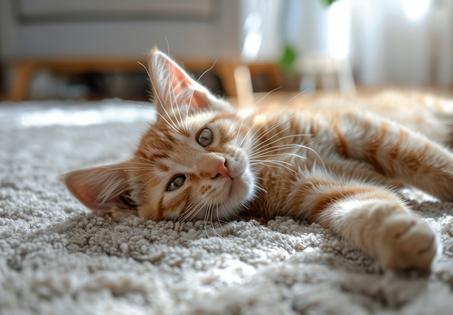My Pet World: Managing behavioral challenges — Peeing issues, cognitive decline, and aggression
Dear Cathy,
I have a rescue cat who has always been skittish, but developed unfortunate peeing habits at about a year old. I tried hyper cleaning litter boxes (we have four) and changed litter types, but nothing has helped. We have pulled up the rugs in the house. I did the whole workup with the vet, and he put him on medication, which helped. But occasionally, if a bathroom rug is left on the floor after a shower and he sees it… he pees on it. The same goes for a piece of clothing or towel. We have learned to adjust. But do you have ideas on other things we can try?
— Peggy, Southington, Connecticut
Dear Peggy,
Cats can develop fixations on specific textures, like rugs or clothing. In addition to the medication and keeping rugs off the floor, try to maintain a routine to ease your cat’s anxiety.
In addition to adding/moving litter boxes near where your cat urinates, consider introducing more environmental enrichment, such as vertical cat trees or shelves, interactive toys, and puzzle feeders to keep him mentally stimulated and reduce overall stress. Pheromone diffusers and collars can help with litter box issues and create a more calming environment.
You may also want to experiment with different types of rugs or fabrics that aren't as appealing to him. Changing the texture or adding a deterrent (like double-sided tape) to problem areas can help discourage the behavior. You can also spray the rugs with Bitter Apple (available at pet stores) to see if it works as a deterrent.
Dear Cathy,
Three people in my family all died from Alzheimer's Disease. Do dogs get it? Jersey, my 12-year-old rescue, will go outside and just stare into space for long periods. She has been an excellent companion but has been soiling on the concrete recently. As I have lived with people who have had Alzheimer's, I never scold or said "no" to her. I asked my vet about this, but he just sidestepped my questions.
— Michael, Kingman, Arizona
Dear Michael,
As dogs age, they can develop dementia, also known as canine cognitive dysfunction (CCD). Like humans, it impacts their behavior and cognitive abilities. It's common to see symptoms like staring into space, confusion, or accidents in the house, much like you've described with Jersey.
There are treatments that can help slow the progression of CCD, so it’s important to address Jersey's needs early on. Talk to your vet — or seek a second opinion if your current vet continues to sidestep your concerns — about how best to help Jersey maintain a good quality of life as she ages.
In the meantime, keep her routine as consistent as possible, as this can help ease some of the confusion she may be experiencing. Gentle walks, puzzle toys, or engaging with her in simple ways can also help her mentally. Your love and understanding will make a difference as she navigates this stage of her life.
Dear Cathy,
After she passed away, I adopted my mom's 15-year-old male cat, Lester. This cat has not been around other cats. I have two male cats. All cats are neutered. After the adjustment period, Lester has made it his mission to be a top cat in the house. Not only that, but he also tries to corner and fight with my other cats. These confrontations seem to occur in the early morning or at bedtime. So, how can I calm my senior cat and get him to leave the other two alone?
— Going Cat Crazy in Sheboygan, Wisconsin
Dear Going Cat Crazy,
It can take weeks or even months for cats to fully adjust to a new home, especially in a situation like Lester's, where he is meeting two new cats. Be observant to ensure the other cats aren't provoking him, which can contribute to the tension. To help calm things down, I recommend pheromones, either diffusers or collars. There are also over-the-counter chewable, calming products that may help.
Additionally, ensure you have enough resources — like litter boxes, feeding stations, and resting areas — to avoid competition. A good rule of thumb is to have one litter box per cat plus an extra one. Creating vertical space with cat trees or shelves can also help give each cat their territory, which can ease some of the tension.
Set a consistent daily routine with structured feeding times, play sessions, and quiet time for each of them. This can help reduce stress by creating predictability. You could also use puzzle toys to mentally stimulate your cats and distract them from being aggressive with each other.
_____
_____
========
(Cathy M. Rosenthal is a longtime animal advocate, author, columnist and pet expert who has more than 25 years in the animal welfare field. Send your pet questions, stories and tips to cathy@petpundit.com. Please include your name, city, and state. You can follow her @cathymrosenthal.)
©2024 Tribune Content Agency, LLC.
(c) 2024 DISTRIBUTED BY TRIBUNE MEDIA SERVICES, INC.












Comments